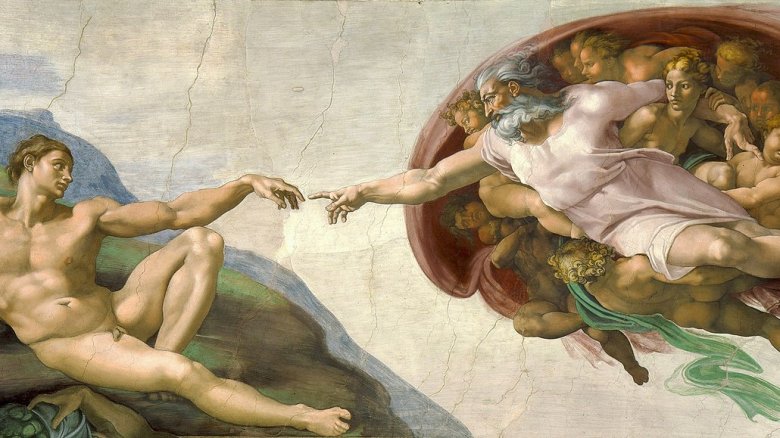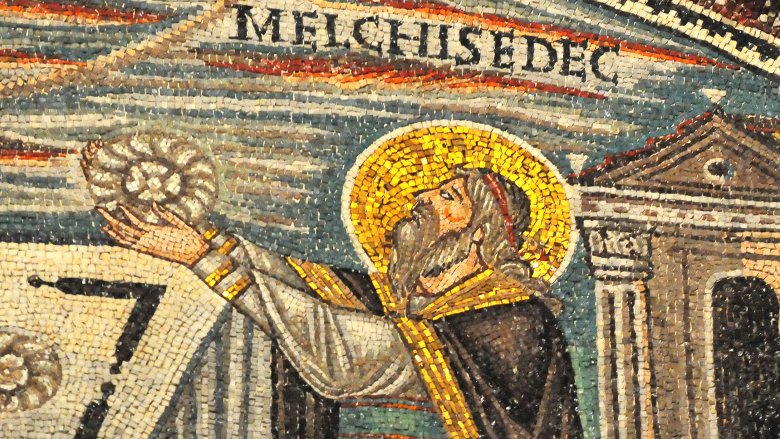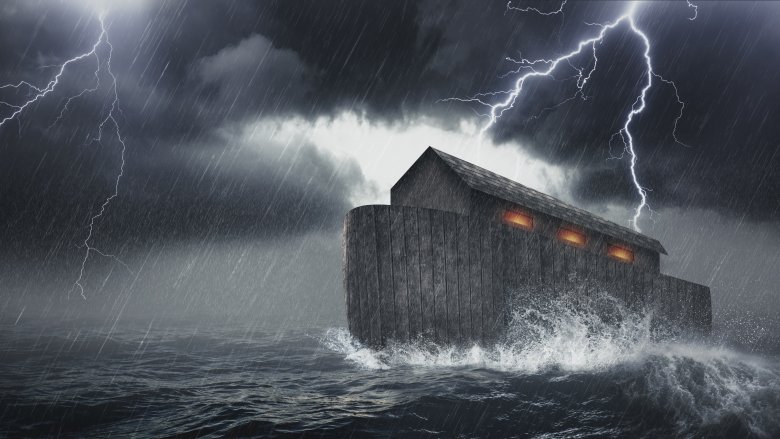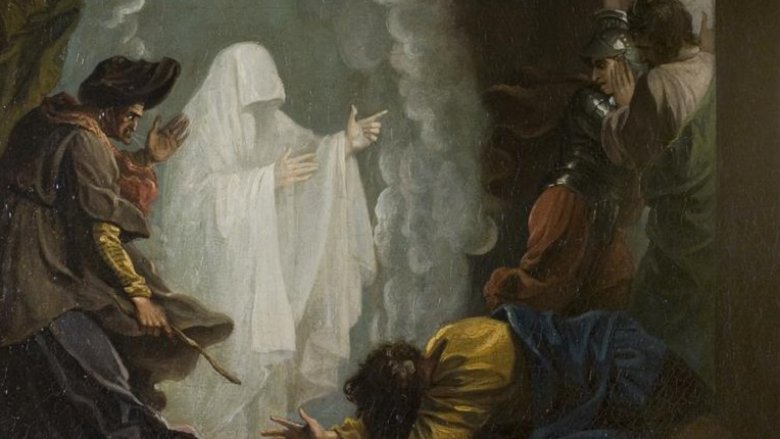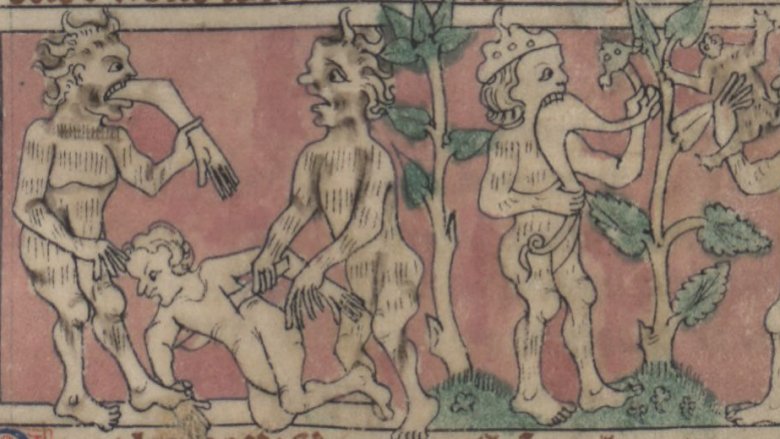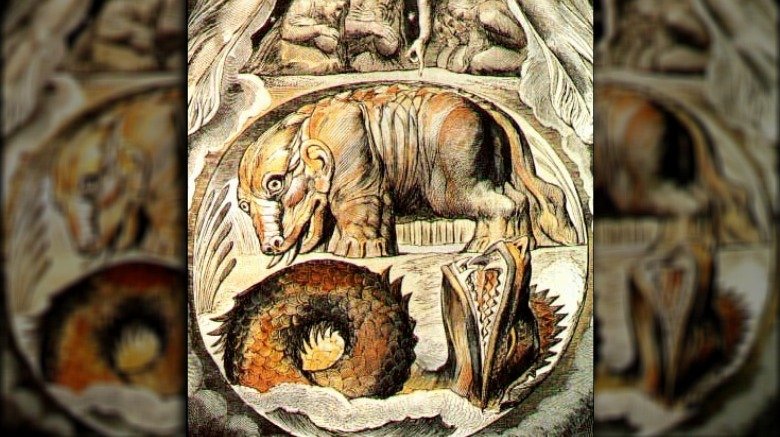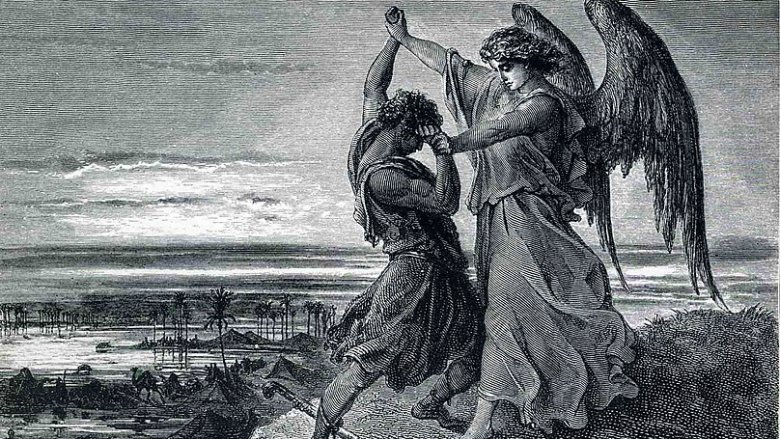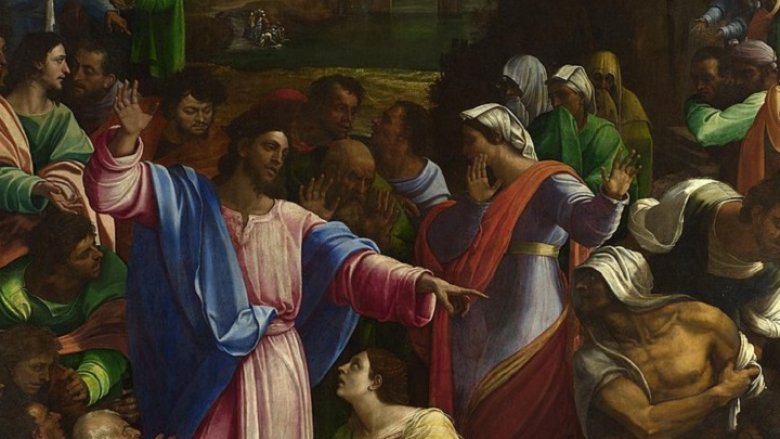Huge Bible Storylines That Completely Disappeared
The Bible is known as the "greatest story ever told," which is not bad considering it doesn't have even a single scene set in Westeros. People who use this phrase are presumably referring to the sublime beauty of the book or the impact it had on their lives, as opposed to the Bible's value as a work of fiction. That's because the Bible's multi-millennia narrative isn't the sort of sweeping, expert piece of storytelling you'd expect from Game of Thrones. It's the sort of sprawling, convoluted mess you'd expect from the worst seasons of Lost.
Just like J.J. Abrams, God loves nothing more than inserting clues and Easter eggs into his narrative that never lead anywhere. There are characters who are mentioned once in reverential tones and then never appear again. Events that are described that seem like they're of major importance, but then get totally forgotten. They say God giveth and taketh away, but judging by these examples he sometimes giveth and then forgetteth all about it.
Cain lives in the Land of Nod, but good luck finding it!
Early in Genesis, we get one of the Bible's all-time hits: the story of Cain and Abel. It's a simple tale. Cain and Abel both make offerings to God, God prefers Abel's, so Cain murders his brother in a fit of jealous rage. Genesis 4:16-17 ends with God sending Cain to live in the Land of Nod, where he takes a wife, has a son, and builds a city. Sounds straightforward ... until you realize the Bible fails to mention where or what this mysterious place is.
We don't even know if it's metaphorical. "Nod" comes from a word that means wandering or exile, so some scholars suggest it's just a fancy way of saying Cain had to leave his people. On the other hand, a lot of locations in the Old Testament are real places, so maybe Nod is, too? Everywhere from the Caucasus to China have been suggested as possible locations. But it's not like it matters. After that one major name check, the Land of Nod never appears again.
If you want to know what crazy adventures Cain got up to there, you need to turn to Josephus' first-century book Antiquities of the Jews. In what reads like an excellent early example of fan fiction, Josephus has Cain spend his exile doing wicked things like raping, murdering, and, um, creating the first system of weights and measures. What a complicated man.
Melchizedek is basically the immortal son of God, but let's not mention him again
Have you ever watched a series that goes out of its way to introduce an insanely powerful character whose mere existence changes everything, only for that character to never appear again? Of course you haven't. No one writes the groundwork for Thanos, ominously introduces him at the end of Avengers, and then pretends he doesn't exist anymore. The Bible on the other hand loves pulling stuff like that. Just check out Melchizedek, a priest who appears out of nowhere and is apparently immortal.
The clearest reference to the unkillable priest (easy action movie title) comes in Hebrews 7. There, the author describes Melchizedek as a guy "without father or mother ... without beginning of days or end of life, resembling the son of God." This eternal proto-Jesus was once so important that Abraham paid tithes to him. According to Britannica, this has no parallel in Biblical literature. Melchizedek was a Canaanite, and for a Hebrew as important as Abraham to give respect to a Canaanite ... let's just say it's unusual.
There's also Psalm 110, which vaguely alludes to Melchizedek being a prototype for a future messiah. That messiah turned out to be Jesus, so it's entirely possible Melchizedek is God's first attempt at making mankind's savior. Basically, this guy is a major deal and, after briefly introducing him, the Bible decides we don't need to know any more about him. Typical.
The Nephilim died in the Flood, or did they?
Of all the merely-hinted-at backstory in the Bible, the history of the Nephilim has to be the most tantalizing. Genesis 6 says they were created by the union of "sons of God" and "daughters of humans," with the King James Version flat-out calling them giants. But before we can learn much about them, God goes and destroys the entire Earth in an apocalyptic flood, and everything not on Noah's Ark drowns.
But, like a Doctor Who cliffhanger giving us the merest glimpse of a Dalek to keep us coming back next week, the fourth book of the Bible then drops in a gasp-inducing passage. Numbers 13:32-33 includes a report on a nearby land some of the Israelites visit, where the Nephilim still roam and are now so big that the Israelites look like "grasshoppers" to them. If you're hoping for Attack on Titan: Bible Edition, though, prepare to be disappointed. After that the Nephilim drop out the tale for good.
We hear about something vaguely Nephilim-like in Deuteronomy 3, where the defeated king Og is said to sleep in a bed nine cubits (13.5 feet) long. But Og is apparently a Rephaite, a different race of giants the Bible tells us exists then never bothers to fill us in on. You also have Goliath in 1 Samuel; he was abnormally tall but shorter than Og. But ... whatever. Giants, sometimes, maybe. No biggie.
So suddenly witches can raise the dead
It's pretty clear God does not want us consulting with witches. Leviticus 19:31 says you will be defiled by them, while other verses stress they are tools of Satan. So, witches exist and have powers, but stay away from them because it's really all a load of evil baloney. Oh, except for that time the King of Israel visited a witch and she totally summoned the dead spirit of a great Hebrew prophet.
In 1 Samuel 28, the judge-prophet Samuel has recently died, and Saul has turned Israel into his personal kingdom. With the Philistines massing on their borders, Saul prays to God for guidance but gets nothing in reply. So he has his men track down the last witch in the kingdom and asks her instead. The Witch of Endor summons Samuel's spirit, which promptly chastises Saul for straying from God and predicts he and his sons will die in battle the very next day. Spoiler alert: he's right.
This is a major plot twist, up there with discovering the island in Lost can travel through time. Rather than just tricksters, witches are capable of calling on the spirits of God's most beloved prophets and having them deliver accurate prophecies. It seems like something that should shake up the Biblical narrative, but no. By the time we get to Galatians 5, witchcraft is morally ranked alongside drunkenness and orgies again.
Is there a talking donkey wandering about?
It's said you can find the answers to everything in the Bible. Apparently that includes the question "what would happen if Shrek were set in ancient Judea?" In Numbers 22:21-39, a guy called Balaam goes out for a ride on his donkey. Three times, the donkey notices an angel blocking the way ahead, and is beaten by Balaam for refusing to go on. After the third time, the Bible says God "opened the donkey's mouth." In plain English, God gives this donkey the power to talk. The best part? At no point does the Bible specify that this power was taken away again.
Aside from making an awesome jumping-off point for Biblical fan fiction, the story of Balaam and his donkey raises a galaxy of questions, absolutely none of which are ever answered. Like, was the donkey a truly rational, sentient being that simply couldn't express itself before? When we hurt animals, are we actually hurting things that can understand abstract concepts like theology? If not, isn't there a Flowers for Algernon problem here of God giving human-level intelligence to a donkey and then taking it away again?
Not that Donkey's power is definitely taken away again, since the Bible doesn't specify. It could be there's a chatty donkey wandering through the background of the rest of Numbers, but everybody's too freaked out to ever mention it.
Watch out for Gog and Magog, whoever they are
As cameos, the fleeting appearances of Gog and Magog in the Bible barely even reach the "blink and you'll miss it" level of duration. Taken as a pair, they appear a grand total of two times. (Gog has an extra solo appearance.) But both times, they are hella important. According to Britannica, the first reference, in Ezekiel 38, portrays Gog as the leader of a land known as Magog, and the guy who will one day attack and nearly destroy Israel. In the Book of Revelation, Gog and Magog are the two great nations of Earth that Satan will one day rally to his cause, leading to the Day of Judgment.
In pop culture terms, Gog and Magog are basically the final season Big Bad of the Bible, the unknowable threat lurking in the shadows that's gonna spell trouble for the Superfriends/disciples at the narrative climax. As you've already guessed, though, that climax never comes. In the same way that a planned film trilogy might flop and fade after its second part, the Bible ends not with a conclusion, but with the Book of Revelation, effectively an extended trailer for all the awesomeness that never comes.
"Well, it is a prophecy," you might be thinking. "Surely it might still happen in the future." Yes, although Revelation 1:1 says this will all happen "soon," and plenty of humans have gotten tired of waiting the last couple millennia. Maybe someday.
Behemoth is so big we never get to see it
The Book of Job is an odd book. It features the heavenly equivalent of a drunken bet between God and Satan, which leads to God letting Satan absolutely go to town on the innocent Job. But even ignoring the idea that God will do satanic things just to prove Satan wrong, the Book of Job stands out for the flippant way it introduces major details that still have scholars scratching their heads. In Job 40:14-24, God trash-talks Job like a professional wrestler by comparing all of his accomplishments to Job's. But rather than bagging WWE titles and pinning Stone Cold Steve Austin, God's biggest brag turns out to be creating something called Behemoth.
Behemoth is big. God goes into epic details about its cedar-like tail and iron-like limbs, which are apparently so strong it can withstand a rushing river. He then follows this up in Job 41 with a similar brag about Leviathan, a gigantic sea monster that is apparently also a fire-breathing dragon. Some Christians think the two are meant to be dinosaurs.
You'd think a couple of dinosaurs running around the Old Testament might be something that people would mention from time to time: "Where art Ezekiel? Eaten by velociraptors, my Lord." But, no. Behemoth appears and disappears in a single monologue.
Biblical Wrestlemania
Everything can be improved with wrestling, even the Bible. In Genesis 32:22-32, Jacob and his two wives are just in the process of moving camp when a guy appears out of nowhere and starts wrestling Jacob. Like a WWE star whose title match has just been invaded, Jacob fights back and the two men grapple till dawn, presumably while Jacob's wives get some sort of chant going and throw steel chairs into the ring. At daybreak, the two wrestlers are at a draw when the mysterious guy uses magic to dislocate Jacob's hip. It's at this point Jacob realizes he's just survived an all-night wrestling match with God himself.
The consequences on the narrative are immediate. Jacob changes his name to Israel and spends the rest of his life walking with a limp. So why include it here? Think about it. Jacob wrestled God to a draw. You know that old paradox about whether God could create a rock so big that even he himself couldn't lift it? Well, God apparently created a man so good at wrestling even God couldn't beat him without cheating.
The implications are enormous. God can knock up a universe in six days, but he can't even piledriver a lowly human into submission? Either Jacob is secretly divine, or the rest of the Bible should just be a how-to manual for acquiring his rad wrestling skills.
Paul stars in Lazarus II
One of the Bible names everyone knows is Lazarus, a guy who died and was raised from the dead by Jesus. That's a pretty nifty trick, even by Jesus' standards. While people are rising from the dead all the time in the Old Testament, the only resurrections in the New Testament come courtesy of Jesus, and St. Peter, who explicitly has Christ working through him. Bible rule: Raising the dead from 1 A.D. onward is only for the big JC himself.
Oh, except for that time in Acts 20:7-12 when Paul literally bored a guy to death and then brought him back to life like it was no big deal.
That "bored to death" bit isn't flippancy. Paul goes to Troas to do some preaching. There, "seated in the window was a young man Eutychus, who was sinking into a deep sleep as Paul talked on and on. When he was sound asleep, he fell to the ground from the third story and was picked up dead." Paul rushes downstairs and brings him back to life. From that point on, people are bringing their deceased loved ones to Paul, imploring him to use his power, but no. All that happens is Eutychus' family are so pleased that they break some bread, and no one else gets resurrected ever again.
Moses's Cushite what now?
Moses' wife, Zipporah, is something of a mystery. She's namechecked in the Bible only four times, and most of those times are so she can get married to, bear a child for, or be sent away by Moses. We know almost nothing about her, which is more than we can say for Moses' second wife. In Numbers 12:1, it's briefly mentioned that Moses has taken a Cushite wife. And, just like that, the Bible throws a gigantic wrench in everything.
Cush was an area encompassing what is now Sudan and Ethiopia. This would imply Moses took a black wife, which is a great win for racial equality but confusing from a narrative perspective. The Cushite wife is never mentioned again, seemingly never bears Moses children, and never has any known effect on other events. So it's tempting to suggest that Zipporah was Cushite all along and the "two" women are one and the same. Some take this view, but we already know Zipporah was a Midianite.
In the Jewish tradition, it's claimed that Moses' followers used "Cushite" to mean someone who looked different, and that Zipporah was called Cushite because she was so beautiful. That seems a stretch, which may be why Josephus effectively said "nah, the woman is totally a hot Ethiopian princess Moses is getting down and dirty with," and created a backstory from first-century Jewish legends to reinforce his version.
The curse of Ham, a poisonous digression
The Bible is an odd book. There are talking donkeys, incest, and prohibitions on eating shellfish. But the oddest of all has to be the curse of Ham, which is far less delicious than it initially sounds. In Genesis 9:20-27, Noah gets loaded on wine and passes out naked in his tent. His son Ham comes in, sees his father, and runs to tell Noah's other sons. The other sons cover their father without seeing his dongle, Noah wakes up, and then curses Canaan's descendants to forever be slaves. If you're thinking "back up a moment, why does Noah curse this Canaan guy?" then you're not alone. Canaan is Ham's son, Noah's grandson, and is entirely blameless, yet still Noah curses him to a life of servitude.
Within the Biblical narrative, this is just another of those things that pops up and then never appears again. But this is, sadly, one case where the huge moment that disappeared didn't vanish in the strictest sense. Out in real life, a whole bunch of people looked at this passage, looked at the human beings they were keeping chained up, and said "whelp, I guess it's God's will we keep slaves."
As the New York Times describes, Islamic, Jewish, and Christian cultures have all used the curse of Ham to justify slavery over the centuries, contributing to a whole lot of human misery. If only the Bible had featured a follow-up tale where Ham gets uncursed, maybe some of that suffering could have been averted. (Or maybe people would have just found other justifications for slavery.)
Everyone forgets Bartholomew's adventures
The Twelve Disciples are like the rock supergroup of the Biblical narrative: super-famous together, and still recognizable alone. Most people can probably name Peter, John, Matthew, Doubting Thomas, Judas, and maybe a few more off the tops of their heads. Heck, some can probably make a good stab at relating one of their group adventures, the one where they all went off to preach following Christ's ascension to Heaven. But Bartholomew? Not so much. According to Britannica, he's mentioned in all four lists of Apostles in the New Testament. Aside from that, his name appears a grand total of zero times.
This is a level of obscurity-amid-fame not even the guys from U2 who aren't Bono or the Edge can aspire to. Even the other apostles who don't have much screentime in the New Testament are traditionally thought to have had legendary adventures. Bartholomew, on the other hand, has no legends beyond preaching here and there and getting flayed alive after he annoyed some ancient king (shown above). You might think being one of Jesus Christ's dozen hand-picked representatives on Earth would ensure your name and deeds went down in history. Not if you're Bartholomew.
